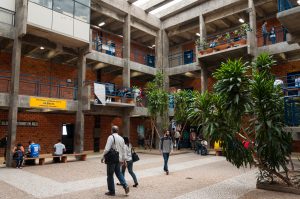English Language and Literature
 The origins of the English Language and Literature program date back to the 1960s, the same decade when the Universidade Federal de Santa Catarina was founded.
The origins of the English Language and Literature program date back to the 1960s, the same decade when the Universidade Federal de Santa Catarina was founded.
The program’s curriculum is organized around three main axes: Linguistics, Literature, and Translation. Supported by a highly qualified faculty, the program covers different theoretical and thematic approaches to discourse analysis, English literature, translation studies, applied linguistics, literature and cinema, among other areas. In addition to courses on these subjects, students have at their disposal a wide range of elective courses and Academic-Scientific-Cultural Activities (ACCs) that diversify and enrich their training.
English Language and Literature students can choose between two degree options. If they opt for the teaching degree (licenciatura), they must complete a supervised teaching internship at a public school and are then qualified to teach after graduation. If they choose a research-focused bachelor’s degree (bacharelado), they must develop an undergraduate thesis (TCC) for degree completion.
Graduates in English Language and Literature have a wide range of career opportunities. One of the main fields is teaching, especially in primary and secondary schools and language institutes, as well as pursuing an academic career at universities after completing a master’s and doctoral degree.
Professionals may also work in companies teaching specialized language courses, in publishing houses and advertising agencies with text preparation, standardization and proofreading, or in translation, including technical, academic and literary texts, as well as subtitling for films, games and software. With strong language proficiency and additional training, graduates can also work in areas such as foreign trade, diplomacy and tourism, securing positions in airlines and travel agencies, among others.
| Program Length: 8 semesters (4 years) |
| Website: https://ingles.ufsc.br/ |
| Classes held in the afternoon. |





 Energy Engineering focuses on generating solutions for a great current challenge related to the production, storage, distribution and use of energy and the impacts associated to these processes. In this context, energy should be understood in a broad sense and not only as electrical energy.
Energy Engineering focuses on generating solutions for a great current challenge related to the production, storage, distribution and use of energy and the impacts associated to these processes. In this context, energy should be understood in a broad sense and not only as electrical energy. UFSC Electronic Engineering program trains professionals with a high technical qualification to work in various market segments, such as information technology (IT), semiconductors, aerospace, automotive, biomedical engineering, telecommunications, electrical/electronic, among others.
UFSC Electronic Engineering program trains professionals with a high technical qualification to work in various market segments, such as information technology (IT), semiconductors, aerospace, automotive, biomedical engineering, telecommunications, electrical/electronic, among others. The Economics program is one of the most traditional undergraduate programs at UFSC. Its creation dates back to 1943, prior to the foundation of the university, and it is the main reference in Economic Studies in the state of Santa Catarina.
The Economics program is one of the most traditional undergraduate programs at UFSC. Its creation dates back to 1943, prior to the foundation of the university, and it is the main reference in Economic Studies in the state of Santa Catarina. The Dentistry program aims to contextualize, investigate and teach the necessary knowledge to prepare dentists or dental surgeons for a contemporary career that promotes health based on the precepts of ethics, morality and science.
The Dentistry program aims to contextualize, investigate and teach the necessary knowledge to prepare dentists or dental surgeons for a contemporary career that promotes health based on the precepts of ethics, morality and science.